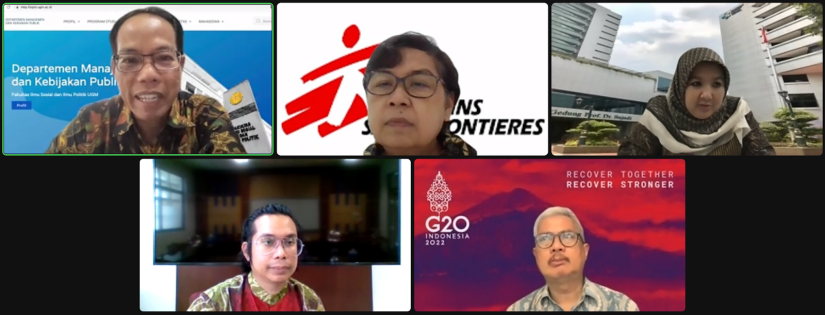
Yogyakarta, July 15th 2022─The Faculty of Social and Political Sciences or FISIPOL UGM also enlivened the “Indonesia G-20 Presidency: Leadership for a Just and Sustainable World Order” by holding a FISIPOL Focus Group Discussion (FGD) Series. After successfully holding the first session to discuss the global work regime, the FISIPOL FGD Series is back with a second online session on Friday (15/7) in collaboration with the Institute of International Studies or IIS UGM. With the theme “Global Health Architecture Reform: Towards the Equitable and Just Health Governance”, the discussion was led by Dr. Muhammad Rum from HI FISIPOL UGM and invited three speakers with different backgrounds to discuss strategies and policies in advocating an equal and just global health architecture.
The first speaker, dr. Siti Nadia Tarmizi, M.Epid, as Spokesperson for the G-20 Health Working Group told the series and results of each G-20 activity in the health sector, including priority issues in the topic of strengthening the global health architecture. There were three main issues raised by Nadia, namely building global health resilience, harmonization of global health protocols, and expanding global manufacturing and research centers for pandemic prevention, preparedness, and response.
The discussion continued with the presentation of the second speaker, that was dr. Yoko from Médecins Sans Frontieres Indonesia. In responding to the challenges of global health governance, Yoko departs from the current limitations. “The lack of representation from low and middle-income countries in the decision-making process,” Yoko said in explaining one of the limitations of the current global health governance.

Completing the discussion from the two previous speakers, Prof. dr. Laksono Trisnantoro, M.Sc, Ph.D from FKKMK UGM was present as the last speaker. In the material presented, Laksono closed with several statements. Laksono concluded that currently, the global health architecture is dominated by large pharmaceutical industries that have patent rights.
“Without changing the structure of the global health architecture, balance and equity in health care will be difficult to achieve. In fact, governments in developed countries are also experiencing difficulties,” Laksono said.
In addition to the speakers, the participants were also actively involved in discussions, asking questions, and giving opinions. This series of FGD activities became a space to discuss various strategic issues and agendas in the G-20 Indonesian Presidency forum. Having four series of discussions, the FISIPOL FGD Series is also a form of contribution from FISIPOL UGM in studies and policies related to the G-20 in 2022. Later, the discussion results from the FISIPOL FGD Series will be processed into a G-20 FISIPOL UGM Policy Brief Series.
